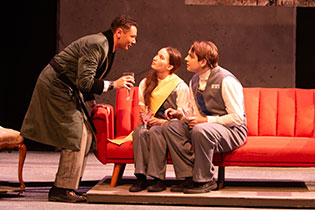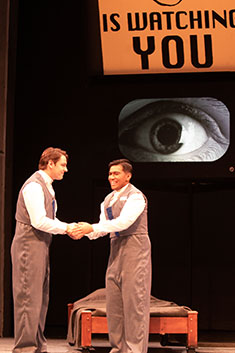People think they know George Orwell’s dystopian novel, “1984,” and some think he was predicting the future of repressive governments and never-ending wars when he wrote the book in 1949.
But what is real and what is fiction? Can you believe everything you read?
These questions and more are pondered in the Wabash College Theater’s production of 1984, which opens Wednesday, October 29 at 7:30 p.m. with performances nightly Thursday and Saturday, and a 2:30 matinee on Sunday. There is NO performance on Halloween. Tickets are free but should be reserved through the Fine Arts Center Box Office.
 Director Jim Cherry, working with Dramaturg Carson Wirtz, spent the summer reading various stage adaptations to find a version for this moment and chose the 1963 play adapted by Robert Owens, Wilton E. Hall, Jr. and William A. Miles, Jr.
Director Jim Cherry, working with Dramaturg Carson Wirtz, spent the summer reading various stage adaptations to find a version for this moment and chose the 1963 play adapted by Robert Owens, Wilton E. Hall, Jr. and William A. Miles, Jr.
Readers of the book surely remember the key take-aways: Big Brother and the Party are watching you. Always follow Newspeak or the Thought Police will purge you. You never, ever want to go to Room 101 and be violently tortured by your worst fears.
“We asked ourselves, ‘How can our production connect with an audience which may know something about the book from popular culture, or who read it way back in high school? How can this theater production accurately render the lessons and themes of the novel?’ This version hits all the high points,” Cherry said.
Orwell wrote the book in 1949 and over the last 75 years, it has seen acclaim and ridicule, and it’s even been banned in multiple states.
Cherry’s production tells the story largely through Winston Smith, whose job it is to re-write history for the Party’s Ministry of Truth. As Winston begins to write a diary critical of Big Brother, he knows he is committing a “thoughtcrime” and is likely to be eliminated – his very existence deleted from history for questioning the Party’s mantra: “War is Peace. Freedom is Slavery. Ignorance is Strength.”
Preston Parker plays Winston, who falls for the beautiful Julia, played by Isabela de Assis-Wilson, though literally no one can be trusted.
So why this play at this time?
“Good theater needs to respond to the moment,” Cherry said. “And we live in a difficult, frightening time: authoritarianism is on the ascent and technology is advancing faster than we can comprehend its consequences. The intersection of these two things is scary, and it’s maybe both unsettling and reassuring that and these are the same issues that scared people 80 years ago.
authoritarianism is on the ascent and technology is advancing faster than we can comprehend its consequences. The intersection of these two things is scary, and it’s maybe both unsettling and reassuring that and these are the same issues that scared people 80 years ago.
“It’s been good to talk about these issues during rehearsals,” he added. “When basic freedoms start to be threatened, you start to appreciate them more. We’re excited to engage a wider audience in a discussion of these big issues that go well beyond politics.”
A recent Broadway production of 1984 was nominated for Tony and Drama Desk awards for sound and lighting. Cherry chose to have his production team lean into those elements and solicited the help of Professor Michael Abbott’s sound design class. “I’ve never worked with a team of sound engineers who are literally changing things up daily. I’m spoiled forever,” Cherry quipped.
The production also uses graphics and videos augmented with ChatGPT and Open AI, and Cherry said the two-month production process has been exciting and educational as he and the crew have worked to weave AI into a live theatrical piece. Cherry hopes the mixture of the human and the technological will create a unique theater experience for Wabash and the Crawfordsville community.
The cast includes some veterans – Parker, Assis-Wilson, Sean Bledsoe (O’Brien), Eamon Colglazier (Charrington), and Alex Schmidt (Goldstein) – but also features freshmen Nicholas Kvachkoff as Syme, Boston Cahoon as Waite, and Andres Ornelas as Parsons and sophomore Javier Cabrera as the Messenger. Senior George Shagley checks one off the bucket list, appearing as Martin in his first-ever theater production. The director’s daughter, Kat Cherry, makes her Wabash debut.
“This is a dark play, yet these have been some of the most fun and funniest rehearsals I’ve ever had here; it’s been a blast,” Cherry says. He gives a nod to Schmidt, who is serving as Stage Manager for the first time and keeps things light during rehearsals.
Scene design and technical direction is by David BW Vogel, lighting design by Bailey L. Rosa, and costume design is by Brandon Thompson. The multimedia design is led by Evan Furuness, Julia Phipps, Michael Abbott, Evan Baldwin, Christopher Board, Ting Lin, Ivann Ochoa, Gregory Powers, Gavin Schippert, and Alex Schmidt.
With an entire ministry focused on rewriting history and Winston writing his own version, the audience must ponder serious questions – just as Orwell did in 1949: What is real and what is fiction? Can you believe everything you read? Is Big Brother watching?